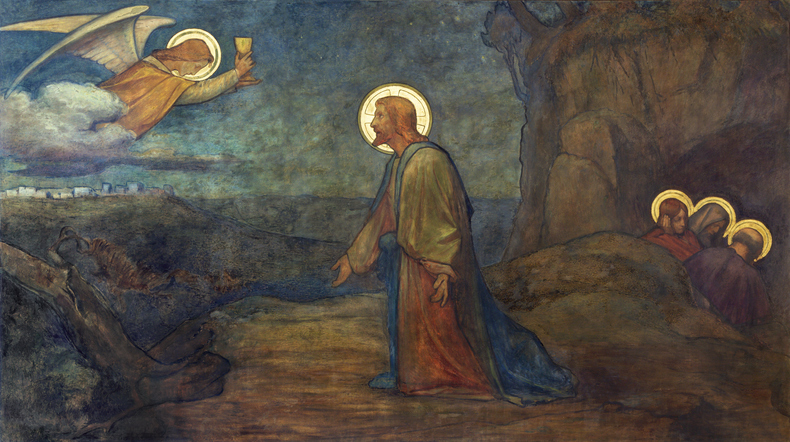Trusting God in the easy times isn’t really trusting.
When life is easy, trusting God is like watching your favorite TV show. You set aside the time, pay attention and keep all distractions at bay because it suits you. It interests you. Every episode serves up the usual entertainment and pleasure you have come to expect from it—you would cancel that show from your watchlist in a nano-second if it didn’t deliver what you expected right when you clicked on it. That’s not trusting; that’s the reasonable expectation of a consumer.
Trusting God in the difficult times takes a whole lot more metaphorical blood sweat and tears than it does in the easy times. It’s actually closer to what Jesus must have experienced in the Garden of Gethsemane—wrestling with the knowledge of impending pain–maybe he was anxious, fearful? Certainly, he suffered the inattention or abandonment of his closest companions:
Going a little farther, he fell with his face to the ground and prayed, “My Father, if it is possible, may this cup be taken from me. Yet not as I will, but as you will.” Then he returned to his disciples and found them sleeping. “Couldn’t you men keep watch with me for one hour?” he asked Peter. (Matthew 26:39-40a)
He was alone. . . face to face with his own emotions. Maybe he thought about the powers he had–knowing he could simply disappear—or maybe perform a miracle and change his circumstances. In the midst of all that, Jesus does 2 things: admits his desire to be rescued from what was coming; he opened his heart to God and his disciples, and asks God to make it go away:
He went away a second time and prayed, “My Father, if it is not possible for this cup to be taken away unless I drink it, may your will be done.” (Matthew 26:41)
Jesus places his trust in God – a decision knowing it will cost him; He surrenders his own will to God’s. That’s trusting God in the hard times.
And in case I should think I am exempt because I am not Jesus, there is this:
Whoever claims to live in him must live as Jesus did. (1John 2:6)
Christ followers spend a life-time learning, failing, re-learning to trust God. A few key principles I want to point out: We can do as Jesus did in the power of the Holy Spirit. And, as Jesus did, we can pour out our heart to our Father in heaven who knows us. We can journey with other believers who, though they may fall asleep right when we need them most, they are God’s chosen context for life in him. Finally, in fear and trembling we place our trust in, decide to surrender to, God’s will rather than our own.
Given the fact that my own will has gotten me into much trouble in my life, I think trusting God and surrendering to his will is the path I will follow. Join me?
A Prayer for Trusting God
Lord, I thank You that You are the God of the impossible. You can do anything. I want to trust in Your possibility and power and not my own. Teach me to see hard times in my life through your eyes, help me to see what you see. Help me to focus on You and Your power. Help me not to fear but to trust You in the hardest of times, in every situation. I declare my faith in you and your promises. You will fight for me and win the battles in my life. You are mighty, powerful, righteous, and true. And you are Christ in Me, the hope of Glory. In Jesus’ name. Amen.

Mary Heathman
Founding Director
Mary often characterizes herself as “a seeker of Truth” and has a long-standing fascination with human behavior and motivation. Her education consists of lay and discipleship counseling, independent study about the integration of psychology and theology, counseling and human sexuality. She also holds a BS in Human Services and an MA in Psychology from Regis University.
Mary attends a Friends (Quaker) Church.
Make a Difference in Someone's Life
If you enjoy reading WGA’s blogs and would like to show your support, please consider making a donation. Where Grace Abounds is a 501(c)3 non-profit organization. The majority of services, including support groups and discipleship counseling, are provided free of charge. Your financial gifts help to cover the costs associated with offering a free program to those who seek WGA’s services.

